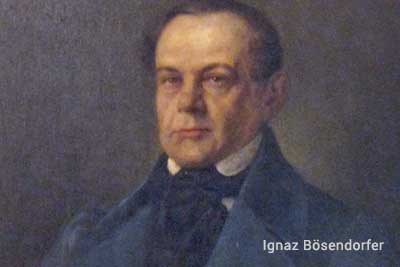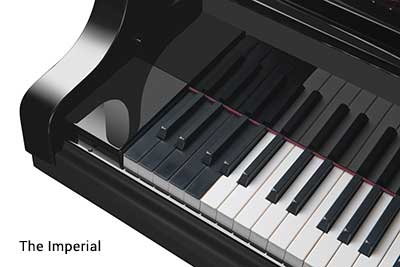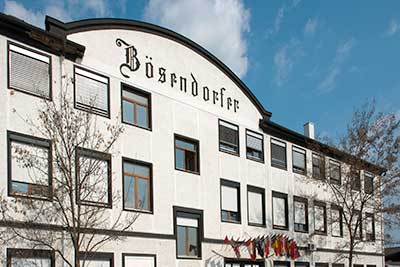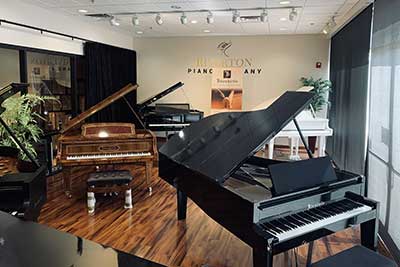 Bosendorfer Piano Company was founded on July 25, 1828. On this date, the company was granted membership into the illustrious Austrian Instruments Manufacturers Guild. From the very beginning, the Bösendorfer family set out to make a piano that would attract the world’s finest musicians and make Bösendorfer a household name in Europe. During the 1800s, Vienna was the global hub for what we now call “classical music.” Composers like Mozart, Schubert, Haydn, and Beethoven were active in Vienna and were just beginning to write music specifically for the piano. The son of a carpenter and an accomplished musician himself, Ignaz Bösendorfer understood the unique relationship between exquisite woods, mechanics and tonality. His designs and materials choices resulted in durable, well-balanced pianos capable of producing strong, vibrant tones. This set the stage for Bösendorfer pianos to become the instrument of choice for the greatest pianists of the time, for large concert halls, for royalty and for many who considered a Bösendorfer piano to be a symbol of social status and sophistication.
Bosendorfer Piano Company was founded on July 25, 1828. On this date, the company was granted membership into the illustrious Austrian Instruments Manufacturers Guild. From the very beginning, the Bösendorfer family set out to make a piano that would attract the world’s finest musicians and make Bösendorfer a household name in Europe. During the 1800s, Vienna was the global hub for what we now call “classical music.” Composers like Mozart, Schubert, Haydn, and Beethoven were active in Vienna and were just beginning to write music specifically for the piano. The son of a carpenter and an accomplished musician himself, Ignaz Bösendorfer understood the unique relationship between exquisite woods, mechanics and tonality. His designs and materials choices resulted in durable, well-balanced pianos capable of producing strong, vibrant tones. This set the stage for Bösendorfer pianos to become the instrument of choice for the greatest pianists of the time, for large concert halls, for royalty and for many who considered a Bösendorfer piano to be a symbol of social status and sophistication.
 Around the same time, Franz Liszt, a young and highly “in demand” pianist and composer, was seeking a piano that wouldn’t “fall apart” from his passionate playing (Liszt was famous for ruining every piano he performed on with his powerful technique). At the time, there were nearly 150 piano builders in Vienna alone and Liszt had tried (and destroyed) pianos from most of them. Then, a few of Liszt’s friends recommended he try a Bösendorfer piano. In 1838, Liszt performed his first concert on a Bösendorfer Piano and was delighted when the piano withstood his forceful performance style. Liszt became the first Bösendorfer Artist, and his endorsement made Bösendorfer pianos famous around the world.
Around the same time, Franz Liszt, a young and highly “in demand” pianist and composer, was seeking a piano that wouldn’t “fall apart” from his passionate playing (Liszt was famous for ruining every piano he performed on with his powerful technique). At the time, there were nearly 150 piano builders in Vienna alone and Liszt had tried (and destroyed) pianos from most of them. Then, a few of Liszt’s friends recommended he try a Bösendorfer piano. In 1838, Liszt performed his first concert on a Bösendorfer Piano and was delighted when the piano withstood his forceful performance style. Liszt became the first Bösendorfer Artist, and his endorsement made Bösendorfer pianos famous around the world.
Before Bösendorfer began to build them, pianos were not designed for the concert stages. They were built for small salon concerts in the houses of royalty and aristocrats. Thus, most pianos weren’t built to withstand the ruggedly “enthusiastic” performances of virtuosos like Franz Liszt or Anton Rubenstein. But, Liszt’s reputation and subsequent enforcement declared the quality and craftsmanship of Bösendorfer pianos to be noticeably superior, and for this reason, in 1839, the Emperor of Austria awarded Ignaz Bösendorfer the official title of “Imperial and Royal Piano Purveyor to the Court.” Bösendorfer was the first piano company to ever be given this honor. It would be the first of many subsequent Gold Medals and First Prizes to come.
By the mid 1800’s, Bösendorfer’s annual output was almost 300 pianos per year, and the demand was growing – as was the brand’s notoriety. In addition to the nobility, emperors and the European elite, the world’s most celebrated artists began to crave Bösendorfer pianos. Johannes Brahms routinely selected a Bösendorfer for his summer performances, Johann Strauss bought a Bösendorfer grand piano for his apartment in Vienna, and Gustav Mahler partnered with Bösendorfer during his student years in Vienna. Bösendorfer pianos were now synonymous with prestige and supreme craftsmanship.
 With the 1900s came fresh ideas and new designs at Bösendorfer. One of the unique new piano designs offered a 97-key keyboard, instead of the traditional 88 keys. The idea originated in 1909 when Federico Busoni contracted with Bösendorfer to create a piano with additional bass notes to replicate the sound of the 32 foot church organ pedals. Busoni was in the process of transcribing Bach’s Organ Preludes, and the bottom bass note on an 88-note piano was simply not low enough. Bösendorfer came through with a truly remarkable design that still thrills audiences to this day. The 9’6″ Imperial (known today as the Bösendorfer 290) grand piano not only offered additional notes, it delivered a much more sonorous character across the entire tonal spectrum with a resonance that no other piano manufacturer can provide. Bösendorfer later created a 7’4″ version of that piano with 92 notes (known as the 225) and it quickly gained popularity around the world for its versatility and warmth.
With the 1900s came fresh ideas and new designs at Bösendorfer. One of the unique new piano designs offered a 97-key keyboard, instead of the traditional 88 keys. The idea originated in 1909 when Federico Busoni contracted with Bösendorfer to create a piano with additional bass notes to replicate the sound of the 32 foot church organ pedals. Busoni was in the process of transcribing Bach’s Organ Preludes, and the bottom bass note on an 88-note piano was simply not low enough. Bösendorfer came through with a truly remarkable design that still thrills audiences to this day. The 9’6″ Imperial (known today as the Bösendorfer 290) grand piano not only offered additional notes, it delivered a much more sonorous character across the entire tonal spectrum with a resonance that no other piano manufacturer can provide. Bösendorfer later created a 7’4″ version of that piano with 92 notes (known as the 225) and it quickly gained popularity around the world for its versatility and warmth.
For nearly two centuries, Bösendorfer has focused on two vital piano building concepts: perfect performance and continuous innovation. That’s why – despite all the competition – Bösendorfer is the oldest continuously operating piano company in the world and the ONLY remaining piano factory in Vienna. At 194 years old, the Bösendorfer company has had a variety of owners (as have all remaining piano manufacturers) and they have endured many hardships, but they have always fought to build The Perfect Piano. …and that commitment to quality and innovation continues to this day.
 In 2008, Yamaha acquired Bösendorfer, its forest, and all its assets. As part of the agreement, Yamaha promised to preserve Bösendorfer’s rich history and the sacred Vinesse traditions that make Bösendorfers such special instruments. The factory would remain in Vienna, Austria, and Bösendorfer’s design team will be free to pursue perfection without interference from Yamaha. In addition, Yamaha would provide Bösendorfer access to the iconic Yamaha Disklavier technology and Yamaha’s global family of piano dealers. With this expanded distribution, updated technology and the support of the world’s largest musical instrument company, Bösendorfer is ready to endure another 200 years!
In 2008, Yamaha acquired Bösendorfer, its forest, and all its assets. As part of the agreement, Yamaha promised to preserve Bösendorfer’s rich history and the sacred Vinesse traditions that make Bösendorfers such special instruments. The factory would remain in Vienna, Austria, and Bösendorfer’s design team will be free to pursue perfection without interference from Yamaha. In addition, Yamaha would provide Bösendorfer access to the iconic Yamaha Disklavier technology and Yamaha’s global family of piano dealers. With this expanded distribution, updated technology and the support of the world’s largest musical instrument company, Bösendorfer is ready to endure another 200 years!
Today, Bösendorfer employs the best piano artisans in the world. These venerable craftspeople use their decades of experience and expertise to handcraft between 250-300 pianos annually. Each piano takes about 6 years from forest to finished and – unlike many other handcrafted pianos – Bösendorfer offers a consistently luxurious sound and touch. Only about 50-60 Bösendorfer pianos make it to the United States each year, making each and every Bösendorfer piano a rare treasure. There is simply no piano on earth that sounds and performs like a Bösendorfer.
The Vienna Concert
 Not only are Bösendorfer pianos still a symbol of social status and sophistication, they are also quite simply the very finest pianos made by human hands. …and their passion for innovation continues as well. In 2016, Bösendorfer introduced its new concert grand, the model “280VC.” This newly-designed piano was the first in Bösendorfer’s new “Vienna Concert” series – a new line of Bösendorfer pianos designed to meet the needs of modern concert venues, artists and collectors without sacrificing the uniqueness of the Viennese style. Based on a preference for a broad tonal spectrum, the new” Vienna Concert” Bösendorfer pianos encompass easier playability and varied volumes without neglecting the richness of partial notes. This gives Bösendorfer an even wider range of expression than before. It’s a sound that can be found nowhere else in the world because it is uniquely tied to the style and traditions of the Viennese piano building philosophy. For the first time, Bösendorfer could design a piano from scratch using tradition, experience and modern technology – like 3D modeling software.
Not only are Bösendorfer pianos still a symbol of social status and sophistication, they are also quite simply the very finest pianos made by human hands. …and their passion for innovation continues as well. In 2016, Bösendorfer introduced its new concert grand, the model “280VC.” This newly-designed piano was the first in Bösendorfer’s new “Vienna Concert” series – a new line of Bösendorfer pianos designed to meet the needs of modern concert venues, artists and collectors without sacrificing the uniqueness of the Viennese style. Based on a preference for a broad tonal spectrum, the new” Vienna Concert” Bösendorfer pianos encompass easier playability and varied volumes without neglecting the richness of partial notes. This gives Bösendorfer an even wider range of expression than before. It’s a sound that can be found nowhere else in the world because it is uniquely tied to the style and traditions of the Viennese piano building philosophy. For the first time, Bösendorfer could design a piano from scratch using tradition, experience and modern technology – like 3D modeling software.
This new software allows Bösendorfer to deliver even greater precision both in tonal projection and in overall craftsmanship. Still made of 80% tone wood (a fact which explains why Bösendorfer pianos are among the most expensive pianos in the world), the new instruments incorporate new string designs and placements, and even hand-made bass strings. This – in conjunction with the new quarter-sawn maple pin blocks – gives Bösendorfer pianos tremendous tuning stability as well as a complex, nuanced tone. Every inch of a Bösendorfer contributes to the overall incredible “singing” sound. It’s no wonder why these pianos are in such incredibly high demand. (Bösendorfer now offers a variety of Vienna Concert models, including the 280VC, the 214VC, the 185VC and the 170VC.)
Bösendorfer Pianos in Arizona
 Aside from being found in some of the most beautiful homes in the Valley, 9’6” Bösendorfer Imperial Concert Grands can be found in every Mesa high school’s performance hall, at Trinity Cathedral, Hammer & Strings Music Conservatory, Arizona State University, and many other institutions and concert halls. In addition, traditional Bösendorfer artisan pianos as well as Bösendorfer’s stunning Ultimate Design Collection pianos can be found in sophisticated homes all over the Phoenix metro area.
Aside from being found in some of the most beautiful homes in the Valley, 9’6” Bösendorfer Imperial Concert Grands can be found in every Mesa high school’s performance hall, at Trinity Cathedral, Hammer & Strings Music Conservatory, Arizona State University, and many other institutions and concert halls. In addition, traditional Bösendorfer artisan pianos as well as Bösendorfer’s stunning Ultimate Design Collection pianos can be found in sophisticated homes all over the Phoenix metro area.
…but none of this information will impact you as much as seeing a Bösendorfer piano in person. Luckily, Riverton Piano Company offers Arizona’s only Bösendorfer Salon – a beautiful place for an unforgettable escape into the world of Bösendorfer pianos. We invite you to experience a Bösendorfer piano for yourself. They are hard to find, but we have a stunning selection ready for you to play! Contact us for your exclusive appointment to experience the largest selection of Bösendorfer Pianos in the area. Experience the Soul of Vienna right here in Phoenix!





